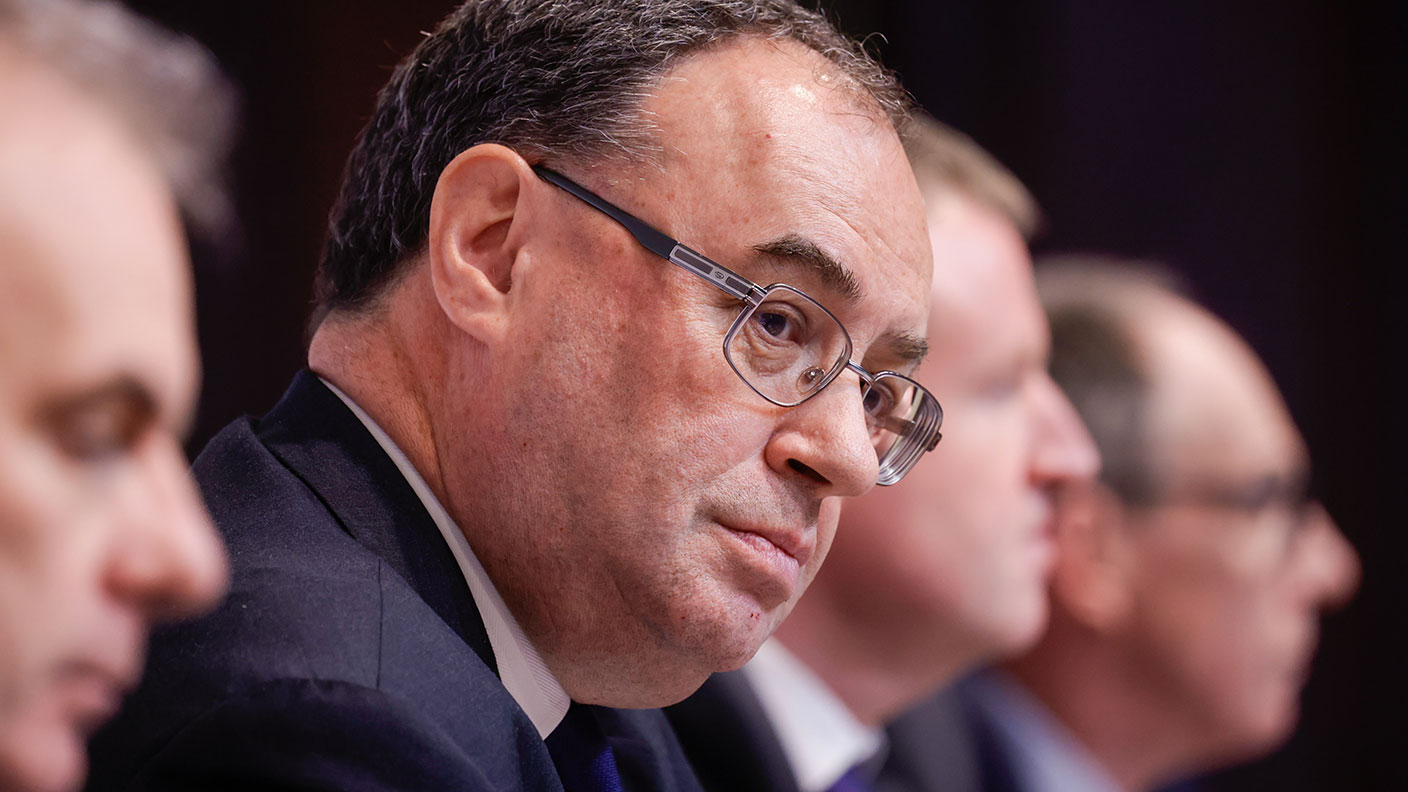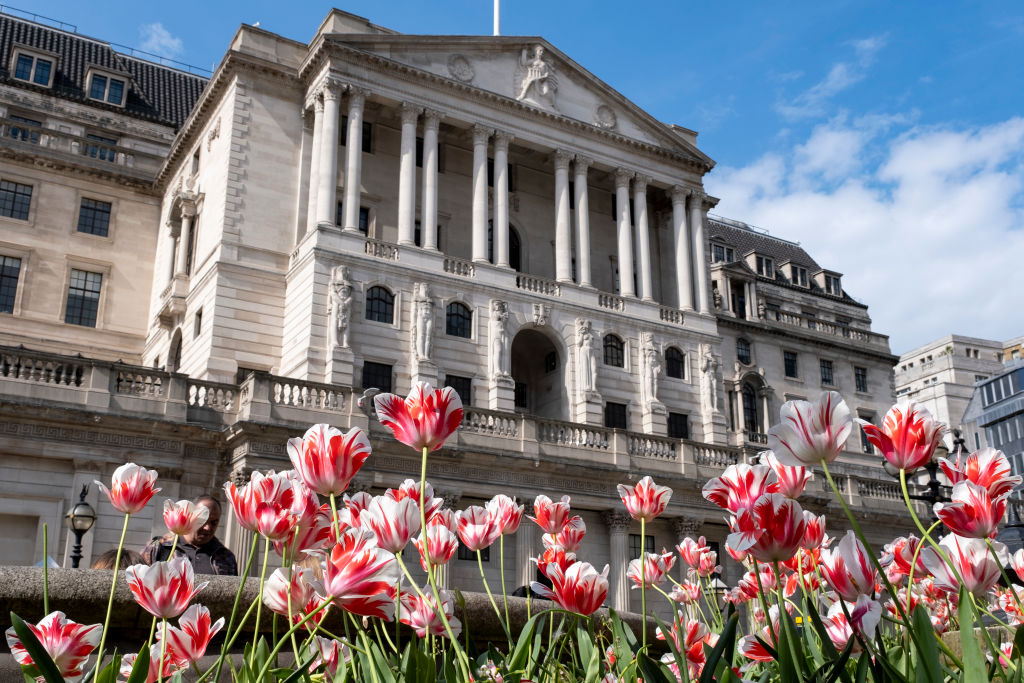The Bank of England has raised interest rates – but with some reluctance
As expected, the Bank of England raised interest rates yesterday – but not with any enthusiasm. John Stepek explains why, and what rising rates mean for your money.


Get the latest financial news, insights and expert analysis from our award-winning MoneyWeek team, to help you understand what really matters when it comes to your finances.
You are now subscribed
Your newsletter sign-up was successful
Want to add more newsletters?

Twice daily
MoneyWeek
Get the latest financial news, insights and expert analysis from our award-winning MoneyWeek team, to help you understand what really matters when it comes to your finances.

Four times a week
Look After My Bills
Sign up to our free money-saving newsletter, filled with the latest news and expert advice to help you find the best tips and deals for managing your bills. Start saving today!
The Bank of England raised interest rates as expected yesterday.
They’re now sitting at 0.75% – that’s back to pre-pandemic levels.
It also happens to be the highest level that UK rates have reached during the post-financial crisis period.
MoneyWeek
Subscribe to MoneyWeek today and get your first six magazine issues absolutely FREE

Sign up to Money Morning
Don't miss the latest investment and personal finances news, market analysis, plus money-saving tips with our free twice-daily newsletter
Don't miss the latest investment and personal finances news, market analysis, plus money-saving tips with our free twice-daily newsletter
Will we ever get back to 1%? And what do rising rates mean for your money?
Interest rates are now at their highest since the financial crisis
The Bank of England may have raised interest rates to 0.75%, but it didn’t sound too enthusiastic about it.
In February, with inflation making everyone very nervous, four of the nine monetary policy committee (MPC) members wanted to raise rates by a full half point. This time, eight voted for a quarter point, and one voted for no rate rise at all.
Meanwhile, those poring over the accompanying statement (the ancients had chicken entrails, we have monetary policy statements – progress, from an animal welfare point of view at least), noted that the MPC now thinks that further tightening “may be” appropriate. Last month, they said it “is likely”.
No doubt about it, the MPC feels less comfortable with raising rates than it did a month ago. As a result, the pound fell somewhat in the wake of the announcement (tighter monetary policy usually means a stronger currency, while looser monetary policy will usually push it lower).
What’s changed? The irony is that the MPC’s cold feet come even though they now expect inflation to be even worse than they had previously expected.
The war in Ukraine has sent commodity prices even higher. That is likely to “accentuate both the peak in inflation and the adverse impact on activity by intensifying the squeeze on household income”.
So inflation will be higher. The MPC had guessed that inflation for April would come in at 7.25%; it now expects to see around 8%.
Just as a reminder here, and one that might give you nightmares – the last time the consumer price index was above 8% (in the early 1990s), the UK base rate was above 10%.
Mortgage rates at that level would of course cause a massive house price crash (indeed, they caused a house price crash back then too), which is just one of many reasons why they’re unlikely to go to that level.
Anyway, getting back to the main point – the MPC thinks inflation will be higher. So why has that made it less rather than more keen to raise rates?
The point of interest rate management
Let’s take a step back for a moment.
Interest rates are an economic policy management tool. Broadly speaking, if you put interest rates up, it becomes harder to borrow and more attractive to save, and you get less money flowing around the economy.
If you put rates down, it becomes easier to borrow and less attractive to save, and you get more money flowing around the economy.
If there’s too much money flowing around the economy, you get inflation. If there’s not enough, you get deflation. At the extremes, both of these are disruptive to economic growth.
Central bankers settled on 2% as a good inflation target in the late 1980s, mostly because New Zealand had found that 2% seemed to work quite well for them in their efforts to get inflation under control.
I’m telling you all this to get the point across that none of this should be viewed as “settled science”. This is not gravity we are discussing; in many ways, it’s more like the rules of a board game which hasn’t been play-tested terribly thoroughly.
Anyway, the basic point is to try to keep interest rates at a level which should optimise the long-term health of the economy: keep people in jobs, keep prices broadly under control, minimise shocks and recessions – that kind of thing. The 2% inflation target was deemed the best performance indicator on that front.
People like me – those who lack faith in mainstream economic explanations for things and in the ability of a handful of human beings to establish the “correct” discount rate for everything – would argue that the 2% target just gave licence to central bankers to add fuel to asset bubbles, aided and abetted by politicians, during the late 1990s and early 2000s. That in turn helped to create the perfect conditions for the financial crisis.
But that’s another diversion. Let’s get back to the matter in hand.
There are no good choices here
The difficult thing for central banks right now is that the headline inflation is being driven by the rising cost of necessities. If petrol and heating cost more, you have less money to spend on other goods. So you can argue that the rising cost of “needs” acts similarly to rising interest rates – it represses economic activity and is in fact disinflationary.
Hence the Bank of England’s reticence about raising rates. High prices should already do the job of demand destruction – why raise rates as well to compound the misery?
There’s a logic to that, but there’s also the risk that if inflation keeps going up, it starts to change behaviour. People spend faster because they can see the value of their money declining; people demand higher wages because they can’t afford to live otherwise.
The role of the central bank then becomes a psychological one. You break the inflationary cycle by making it appear that you won’t tolerate it. In reality, the only way to do that is to raise rates until it hurts (ie by causing a recession).
You’ll note one thing here – there are no good outcomes, regardless of what the Bank of England does. Savers aren’t going to get a rate that gets anywhere near meeting inflation; borrowers are likely to see interest rates go up a bit.
The cost of living squeeze will continue – this is the sort of thing that only government spending can alleviate in the short term, and I suspect that Rishi Sunak is reluctant to do a lot more of that.
We’ll keep an eye on the spring Budget next week to see if he does anything on the energy front or delays the rise in National Insurance rates. But in the meantime, all you can do about this is to monitor your personal finances more intently than you may feel you’ve had to for several years now.
Get the latest financial news, insights and expert analysis from our award-winning MoneyWeek team, to help you understand what really matters when it comes to your finances.

-
 Should you buy an active ETF?
Should you buy an active ETF?ETFs are often mischaracterised as passive products, but they can be a convenient way to add active management to your portfolio
-
 Power up your pension before 5 April – easy ways to save before the tax year end
Power up your pension before 5 April – easy ways to save before the tax year endWith the end of the tax year looming, pension savers currently have a window to review and maximise what’s going into their retirement funds – we look at how
-
 Why Scotland's proposed government bonds are a terrible investment
Why Scotland's proposed government bonds are a terrible investmentOpinion Politicians in Scotland pushing for “kilts” think it will strengthen the case for independence and boost financial credibility. It's more likely to backfire
-
 How have central banks evolved in the last century – and are they still fit for purpose?
How have central banks evolved in the last century – and are they still fit for purpose?The rise to power and dominance of the central banks has been a key theme in MoneyWeek in its 25 years. Has their rule been benign?
-
 UK to have highest inflation among advanced economies this year and next, says IMF
UK to have highest inflation among advanced economies this year and next, says IMFThe International Monetary Fund (IMF) says it expects inflation to remain high in the UK, while lowering economic growth forecasts for 2026.
-
 Is Britain heading for a big debt crisis?
Is Britain heading for a big debt crisis?Opinion Things are not yet as bad as some reports have claimed. But they sure aren’t rosy either, says Julian Jessop
-
 'Britain is on the road to nowhere under Labour'
'Britain is on the road to nowhere under Labour'Opinion Britain's economy will shake off its torpor and grow robustly, but not under Keir Starmer's leadership, says Max King
-
 'Governments are launching an assault on the independence of central banks'
'Governments are launching an assault on the independence of central banks'Opinion Say goodbye to the era of central bank orthodoxy and hello to the new era of central bank dependency, says Jeremy McKeown
-
 Why investors can no longer trust traditional statistical indicators
Why investors can no longer trust traditional statistical indicatorsOpinion The statistical indicators and data investors have relied on for decades are no longer fit for purpose. It's time to move on, says Helen Thomas
-
 Live: Bank of England holds UK interest rates at 4.5%
Live: Bank of England holds UK interest rates at 4.5%The Bank of England voted to hold UK interest rates at their current level of 4.5% in March, as widely anticipated, after inflation rose to 3% in January